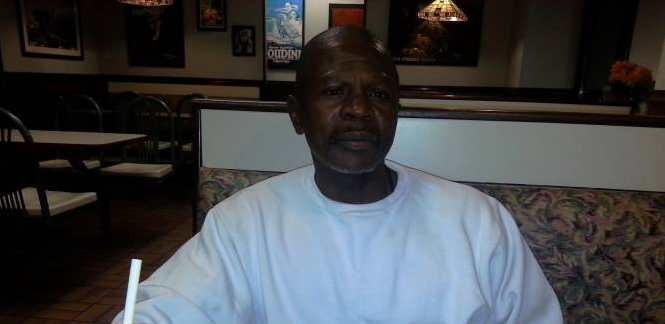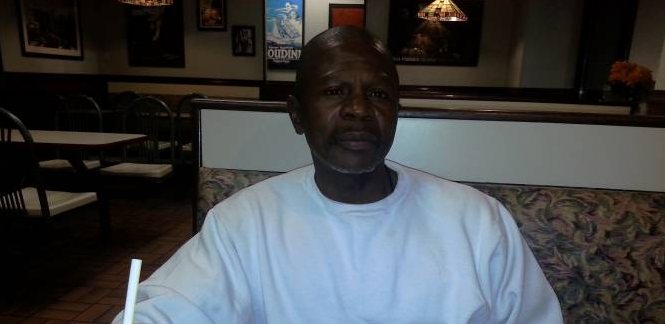
When Louis Postlewaite, Jr., was around 10 years old, he was privy to the sounds of a well-known Motown band rehearsing on the “big old” front porch of his family’s house in Battle Creek, Michigan. Sometimes he would even record the lively music played by Junior Walker and the All-Stars on his reel-to-reel tape, slyly listening for mistakes by the professional musicians.
He had an all-access pass to Battle Creek native Junior Walker and his cohorts thanks to his stepdad, Edmund “Ray” R. Freeman, who, according to his 2011 obituary in the Peoria Journal Star, was a “unique guitarist” who toured and played with the likes of Walker, Wes Montgomery, the Bill Doggett Combo, and numerous other artists. Many years later, at the age of 58, Postlewaite said his stepfather’s licks reminded him of George Benson’s.
But his reel-to-reels are long gone, and the music-filled memories that Postlewaite recalled on his porch during the mid-1960s have faded. Behind the music, Postlewaite and his siblings — an older sister and a younger brother — were largely unsupervised. While his parents went out on tour for weeks with the Junior Walker ensemble, leaving $200 on the TV set in their wake, the children fended for themselves. His sister was in charge when Ray and Mom were gone, but that was laughable.
“I wouldn’t never listen to her,” Postlewaite said.
At a young age, he recalls sneaking out of the house at night with his brother to hang out at a pool hall. Numerous mornings he woke up after those excursions too exhausted to attend the first part of school. Sometimes the guy who ran the pool hall took Postlewaite and a good friend hunting and fishing on weekdays. He’d ask the boys if they should be in school, eventually telling them they needed to be there.
Education was simply not a priority. Postelwaite was skipping school as early as kindergarten and smoking weed rolled up in newspaper by the fifth grade, not understanding what “getting high” meant. He encountered a few physically abusive teachers in Battle Creek: a fifth-grade instructor paddled him for saying “shut up” to a girl; his sixth-grade teacher threw him against a wall.
“He had pulled me out of my seat and he hurt my back,” Postlewaite recalled. “I said, ‘I’m never going to school again.’”
Postlewaite made good on that promise, but it wasn’t entirely because of abusive teachers or the unimportance his family placed on education.
———
To be sure, Postlewaite didn’t totally regard school as a waste of time. Like many children, he discovered the subjects and teachers he liked and latched on to them. His fourth-grade teacher, an Indian lady he had a soft spot for, taught him how to hook rugs. He made a yellow and black one for his mother.
Postlewaite enjoyed math and was especially talented in woodshop, making a footstool and candleholders out of sheet metal for his mom. He no longer knows where those items are.
“Somebody got it, you know. Probably my stepdad,” Postlewaite said, not knowing at the time that Ray Freeman had passed away.
Postlewaite’s life changed drastically when his mom became sick with lupus, a chronic, autoimmune disease that damages the body and can last for years. The Battle Creek kid who built go-carts, rode his bike everywhere with friends, and occasionally went horseback riding suddenly found himself as the main caretaker for his slowly dying mom. Postlewaite and his mother moved in with his mom’s grandparents in Peoria, where he was born. His siblings stayed in Michigan, while Ray, who would end up marrying four other women, fled the family. The danceable sounds and searing saxophone solos of Junior Walker were already long in the past.
“I wanted to do a lot of things until my mom got sick,” Postlewaite said. “Because I took care of her. That’s why I stopped going to school. I took care of my mom.”
When he should have been attending the seventh grade, Postlewaite bathed his mother, read to her, and cleaned her bed sores. He changed her catheter and combed her hair. His grandparents were around to help, but their assistance was limited since they worked. Much of the woman’s care fell on the boy’s shoulders.
“She couldn’t walk,” he said. “I had to put her in the tub. She had lost all her weight. She never smoked or cussed or none of that. But God would give me enough strength to help her get in the tub and get out.”
But a higher power did not take care of Postlewaite’s education as he fell further and further behind. His schooling by this point had devolved to a tutor stopping by the house twice a week for brisk and breezy lessons. He gave the student some pamphlets, helped him work on a problem or two, and dispensed a reading assignment.
Not that Postlewaite, or even his mom, cared about the missed schooling. Nothing was ever said about the boy’s education. He skipped school half the time prior to his mom’s sickness anyway, and a more important goal had been established.
“I just wanted to help get my mom get well. That was my main concern,” he said.
That didn’t happen. His mom perished when he was 16, and Postlewaite’s life took a turn for the worse. The tested youth had dropped out of school, but he showed fortitude in attempting to help and comfort his mother. All that bravery went out the window when she died.
Louis Postlewaite gave up on life for a long time after the death of Norma Jean Sanders, succumbing to drugs, alcohol, and illicit behavior.
———
Through the haze of his nine separate sentences in jail — convictions that ranged from defacing school property to armed robbery — Postlewaite remained a reader and attempted to educate himself, though not avidly. He was not functionally illiterate like sixty percent of prisoners nationwide, but he fell into the large percentage of inmates who failed to finish high school: seventy-five percent of America’s state prison inmates; nearly fifty-nine percent of federal inmates; and sixty-nine percent of local jail inmates, according to 2003 statistics from the National Dropout Center.
The education of Postlewaite was spotty after his mom’s death. Following his first release from the Department of Corrections at age eighteen, he attended a Peoria school called Common Place, taking math and reading. Attaining a GED was somewhere on his radar, but the attempts were halfhearted. Postlewaite ended up “back in the streets” and never received the diploma.
An industrious man by nature, he worked during some of his prison stints, at one time earning $700 a month as a meat cutter at the Hill Correctional Center in Galesburg, Illinois. Making a living behind bars and sending his children money took precedence over receiving an education in prison, though Postlewaite did take courses while incarcerated.
Postlewaite tried to do the right thing by taking care of his mom—he said he would do the same thing over if he had to. Still, he wishes his family had pushed him harder to take education seriously. After years of severe missteps, Postlewaite realizes the value of schooling and its relevance in getting somewhere in society.
“I probably wouldn’t be in the predicament that I’m in now,” he said. “I probably would have did something with my woodshop skills, and my hooking the rugs, and my sheet metal work.”
Postlewaite’s “predicament” entails being on parole and residing in Jesus is the Way Prison Ministry in Rantoul. He talks about pursuing his GED and is striving mightily to stay on the right path. A generous man, he volunteers at several organizations, attends church and Alcoholics Anonymous meetings regularly, and he can walk to his job as a detailer at Shields Auto Center. He recently graduated from the ministry.
“I’m not eager to do nothin’ real [exceptional],” Postlewaite said. “Just save money, try to live a comfortable life the right way. Be an asset to the community.”
And possibly work toward the learning opportunities that eluded him for so long.
“I’m gonna get my GED one day,” he said. “I’m gonna get it.








